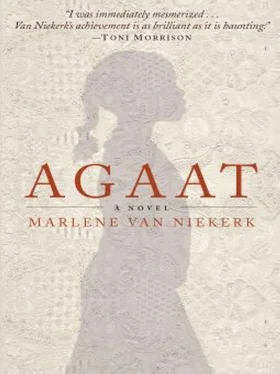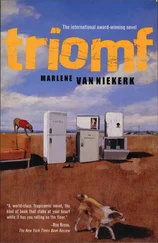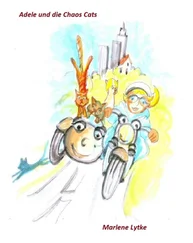And then one day after seven years something happened that changed everything.
The woman was expecting her own baby.
Out she said to Good. Out of my house, from now on you live in a little room outside in the backyard.
Take your things!
Here’s a suitcase!
And off with the red dress and off with the green! Here is your apron and here is your cap keep it white and here is your dress it is black and here is your bed next to the dogs’ kennel and here is your plate and your mug of tin and from now on you’ll eat alone.
And here’s your book to learn how to farm and the Bible, see to it that you look after your soul and here’s a big white cloth learn to embroider nicely to decorate your room.
From now on you’re my slave. You’ll work for a wage.
And Good’s heart was very very sore. But not for long and then it grew as hard as a stone and black as soot and cold as a burnt-out coal. And she took the suitcase filled with the dresses and shoes and things of the child she’d been and went and buried it deep in a hole on the high blue mountain across the river. And piled black stones on top of it. And trampled it with her new black shoes and cocked her crooked shoulder and pointed with her snake’s-head hand and said:
Now, Good, you are dead.
Nobody noticed anything of Good’s mourning because she cried without tears. Every day she kept doing her work faithfully. Fed the dogs, scrubbed the kitchen floor, cleaned the fireplace, polished the silver and buffed the table to a shine and rubbed the sheets in the soapy water till they were staring-white and ironed them in knife-sharp folds and stacked them in neat piles in the linen cupboard. She plaited onions and packed pumpkins and slaughtered sheep and plucked geese and cut lucerne with the sickle and brought flowers from the garden and arranged them in vases, the roses, the lilies, the grass.
And the woman said: My good slave, your work is good.
But Good looked at the woman’s hands folded around her stomach that grew bigger and bigger with the child she was expecting. And her mouth was bitter as aloe and her insides were filled with bile.
And after eight months and two weeks in the middle of the morning the woman got birth pains and she said to Good:
Come with me, I’m going to my mother over the mountain. But pack everything that I need, a knife and scissors and forceps and cloths and towels and water and fire, because this child may well want out before noon.
And when they were halfway there, then the woman screamed: The child wants to come!
And there beneath the high sun next to the road where the waterfall foams, Good made a bed of snow-white cloths, and she poured water into a snow-white bowl and she whispered between the woman’s snow-white legs:
Come, little buttermilk, come come little bluegum-flower, come out, snow-white lamb of my même, come!
And the woman she blows and the woman she strains and the woman she farts. And Good she runs and Good she pulls and Good she spits and Good she pushes, and she calls and she curses and she prays and she pleads but the child is stuck like a key in a lock.
Help me! the woman cries, grey are the cliffs and black is the river, Good, I’m going to die, help me!
And Good takes a knife and she takes forceps and scissors and she takes a deep breath and she cuts open the woman’s stomach from top to bottom. And when noon struck in the church towers on both sides of the mountain, then she took the child out of the blood and the slime and she cut the string and she cleaned him and she covered him in cloth and she gave him a name that only she knew about.
You-are-mine she called him.
And he grew up on her breast and she washed him when he was dirty and gave him milk when he was thirsty and rubbed his tummy when he had winds and cooled his forehead when he had fever, and cradled him and comforted him when he cried and sang to him and dressed him and undressed him and put him to sleep every evening in her room in the backyard before she took him into the house. Taught him to walk, taught him to talk and swim and dance and fly and blow on the curved horn of the ram.
I am a slave but You-are-mine, she always whispered in his ear before she handed him over to his mother.
And his mother looked on at Good teaching the child to walk and talk, teaching him to swim and dance and fly.
And she listened to them calling each other by blowing on the horn, the child and his minder far over vlei and hill.
And every evening Good told him how she had rescued him from the grey cliffs and from the black river and chanted rhymes and asked him riddles and hummed songs on blades of grass between her lips by the fire in the outside room and with her little laundry-mangle hand made him shadow-pictures on the wall.
And the woman eavesdropped at the door. She could see through the chink and she could hear through the keyhole and she was jealous, but what could she say and what could she do?
And Good caught the little boy silver fish in the sea, and copper frogs in the dam and showed him the blue butterfly in the forest, and made him trousers of red velvet and a shirt of green cotton and embroidered the Good Shepherd and the Wise Virgin in white on his pillow slips.
See, you are a human being, she showed him in the mirror, and You-are-mine.
And he laughed in her eyes and played at her feet and skipped at her hand under the high trees around the house with the two white gables on the river next to the blue mountain and her heart was lightened and her insides were warmed. And her bile subsided because he was the light of her life.
Tell me more Dolores. Grimm meets Goth in the Overberg.
There’s another story here.
The world is large.
‘Suddener than we fancy it, more spiteful and gay than one supposes, incorrigibly plural.’
Where do I get that from?
‘Soundlessly collateral and incompatible.’
That I would change. Not ‘soundlessly’. Full-sounding, rather, fullsoundingly collateral and incompatible.
I’ll keep the ram’s-horn on the window sill.
Des Knaben Wunderhorn.
And the bellows by the firedog next to the JetEagle.
Blaes blaest — blaes blidt — i blinde,
blaes friskhed til min hyttes baenk
med myge, vege vinde
og regn I sagte staenk.
Blaes blaest — blaes op — fanfarer,
til natten åbenbarer. .
North and south, a frozen interval, a butterfly on felt.
On the flight-information screen the blue dart of the Boeing approaches the great green body of Canada. Plectrum and harp.
I close my eyes to sleep.
GLOSSARY OF AFRIKAANS AND SOUTH AFRICAN ENGLISH WORDS
OED = Oxford English Dictionary , Second Edition
ODSAE = Oxford Dictionary of South African English (1996)
aitsa:hey! How now!
askoek:a dough-cake baked in embers (ODSAE)
baas:employer, owner, manager, now offensive to many (ODSAE)
bakkie:a light truck, a pick-up (ODSAE)
bloedsap:An Afrikaner supporting a predominantly English-speaking political party and not the National Party (ODSAE)
boetie:little brother, an affectionate or sometimes condescending form of address
bokmakierie:a species of shrike
Boland:an area of the Western Cape lying to the west of the Hex River Mountains (ODSAE)
braai, braaivleis:barbecue
Читать дальше












